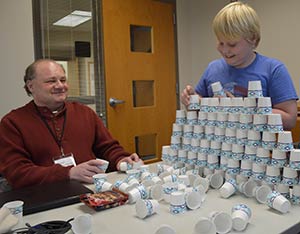Peyton Bradford has his eyes on another Connect Four victory as he drops a red checker into the yellow grid. Aaron Christensen, his adult foe, can hear approximately where it dropped and feels with his fingers to be sure. Then he makes his own move with a black checker.
“Last year he pretty much took me to the cleaners – 34 games to, like, three,” Christensen says with a chuckle of his fifth-grade opponent. “This year it’s a lot closer.”
“It’s five to four. I’m winning by one right now,” Peyton says, just to be clear.
In short order, he’s placed four checkers in a row, diagonally. “I win!” he cheers.
“Good job,” Christensen says. “Don’t get used to it.”
On a Friday afternoon at Meadow Ridge Elementary School, Peyton and his weekly mentor are playing one of their favorite games. Unlike Monopoly, it’s one that doesn’t put Christensen at a huge disadvantage because he is blind.
Nor does his blindness get in the way of their friendship, gently nurtured since Christensen began meeting with Peyton in March. Today they planned to go Christmas shopping for a nursing-home resident. On another day they might be drilling Peyton on partial-quotient division.
“From the first day, we hit it right off,” Christensen says.
Agrees the fifth-grader, “We became good friends.”
For Peyton, it’s a supportive relationship with a caring adult. For Christensen, it’s like having the child he never had, and a way to give after losing his sight – and much of his faith – 20 years ago.

Finding New Life in Giving
Christensen is a mentor for Kids Hope USA, a Zeeland-based program that sends church volunteers to schools throughout West Michigan and beyond. River Rock Church provides Meadow Ridge with 18 mentors who meet with students an hour per week.
A mutual friend suggested Christensen to church Program Director Mandi Molt, who admits she wasn’t sure at first how to make it work with a blind person. But school social worker Rachel Schafer found the seemingly perfect match in Peyton, Molt says: “I think they’re both giving each other life.”
That is certainly true for Christensen, who almost gave up on life at one point.
He lost his eyesight in 1996, a result of Type 1 or juvenile diabetes, which also can cause kidney failure. Half a year later he received a kidney transplant from his mother. He lost his job and his marriage and went on disability.
He recalls staring into his bathroom sink mirror, clutching a bottle of Tylenol and thinking of downing it. But a voice in his head said “Somebody needs you.” From then on he began helping those somebodies.
Christensen, 47, volunteers for the Association for the Blind & Visually Impaired, and is vice president of Mustard Seed Ministries, a nonprofit that repairs homes in West Michigan and New Orleans. When he learned of a chance to volunteer for Kids Hope, he jumped at it. Maybe some kid needed him.
“I’ve gotten a second chance on life,” he says, as Peyton sets up Connect Four. “This is what I love doing – being influential and making a difference.”

Growing by Helping
Christensen has made a difference for Peyton, says Blake Bowman, Meadow Ridge principal. Peyton comes in early from recess to tidy up the conference room where he and Christensen meet, “to make sure Aaron doesn’t trip over anything,” Bowman says. “He just lights up like a Christmas tree at the mention of Aaron.”
Peyton has grown socially as well as academically from his friendship with Christensen, tapping into his potential as a role model for other students, Bowman says. In Feburary he will be honored as his school’s Example in Excellence by the Board of Education.
“It has helped him see himself as a person of value, as a person who can help others,” Bowman says.
That’s not too far from what Christensen learned about himself, and what he hopes Peyton learns from their weekly get-togethers.
The first time they met, he expected the boy to ask him how he became blind and what it’s like. But nothing. Why not? “I don’t know,” says the fifth-grader. “I was young.”
He says he’s since learned plenty from “Aaron,” as he calls his mentor, including about blindness. “I used to think it was really hard and you’d always have to have help. But I was wrong,” he says. “I like that he can teach me how blind people can help.”
Christensen says he’ll continue to meet with Peyton in middle school, if the boy wants him to. For now, he looks forward to their weekly meetings as much as Peyton does.
“We all have love to give,” Christensen says. “One hour a week? That’s not too much to ask to make a difference.”
CONNECT









